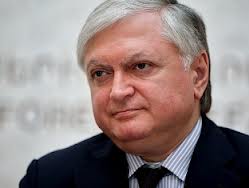In the speech of the American Co-Chairman of the OSCE Minsk Group at the Carnegie Endowment in Washington D.C. it is underlined, that, “together with France, the United States and Russia share a common commitment to peace and security in Nagorno-Karabakh” and they would continue working through the Minsk Group for peacefully resolving this conflict.
The American diplomat is correct, that the parties have almost reached agreements on a number of occasions, and brings 2011 Kazan Summit as the latest example.
It is well-known that because of Baku’s backtrackings, its attempts to snatch one-sided advantages made it impossible to achieve progress in Kazan in June 2011, at the summits in Sochi in March 2011, in Astrakhan in October 2010, in Saint-Petersburg in June 2010, even though the sides were close to reaching agreements. I would like to recall that Baku backtracked several times in the past as well, for instance – 10 years before Kazan, in 2001.
The American Ambassador rightly finds sniper shootings along the Line of Contact, the human losses as unacceptable, highlighting that the OSCE monitors were not able to have neither the mandate nor the resources to identify those responsible, to reduce the reported thousands of ceasefire violations every year.
Read also
As the Co-Chair states, we have many times urged to respect ceasefire agreement reached in May 1994. Unlike Armenia, Azerbaijan has rejected and continues rejecting numerous proposals made by Co-Chair countries to consolidate ceasefire, withdraw snipers from the Line of Contact, and create a mechanism of investigation of incidents and ceasefire violations.
Azerbaijan not only rejects those proposals, it continuously commits gross violations of ceasefire, masterminds provocations, does not respect even its own commitments on maintaining and strengthening the ceasefire – not only according to the provisions of the cease-fire agreement, reached between Azerbaijan, Karabakh and Armenia on May 12, 1994, but also the ceasefire consolidation agreement, reached in the same three-party format on February 4, 1995, according to which Azerbaijan was obliged to refrain from statements that could escalate the situation and to immediately notify to the Armenian sides and Co-Chairs about violations, instead of increasing anti-Armenian propaganda by false accusations. For decades Baku has been violating those commitments.
In two days the 20th anniversary of the establishment of cease-fire is marked, and I hope that the Co-Chairs would use this important occasion to deliver a special statement containing a strong message. It is vital to exclude the use of force, thereby creating utmost favorable conditions for the success of the negotiation process.
We resolutely agree that peoples should be prepared for peace, not war.
Unfortunately until now the Azerbaijani leadership has been doing just the reverse. In spite of the several appeals of the international community to refrain from provocative rhetoric and actions, Azerbaijan continues its bellicose statements, the glorification of murderers and persecution of peace advocates, the propaganda of xenophobia, intolerance and hatred, which leads to raising tension and escalation of the situation in the region.
The elements of the conflict settlement presented by James Warlick in general reflect the proposals of Co-Chair states.
As the Co-Chairs, we continue to believe that the elements outlined in the statements of the heads of the Co-Chair countries in L’Aquila, Muskoka, Deauville, Los Cabos and Enniskillen over the last years can be the foundation of reaching a lasting peaceful settlement of the conflict.
The American diplomat stresses that any enduring peace must reflect the views of all affected parties if it is to succeed. We have several times emphasized that without the full fledged involvement of Nagorno-Karabakh in the negotiation process, it will be impossible to achieve the resolution of the conflict.
The OSCE Minsk Group American Co-Chairman justly observed that any attempt to select some elements over others will make it impossible to achieve a balanced solution.
We share the Co-Chairs’ opinion, expressed many times, that those elements must be seen as an integrated whole and the attempts to give priority to some elements will make it impossible to reach the settlement.
Unlike Azerbaijan, which on the occasion and without makes references to only one principle of international law, in response to the appeals by the heads of Co-chair countries, Armenia has on several occasions reiterated and once again re-affirms its commitment to the principles of international law, particularly the non-use of force or the threat of force, equal rights and self-determination of peoples, and territorial integrity.
Тogether with the OSCE Minsk Group Co-Chairs Armenia will consistently continue to exert joint efforts towards exclusively peaceful settlement of the conflict between Azerbaijan and Karabakh.
Ministery of Foreign Affairs





















































